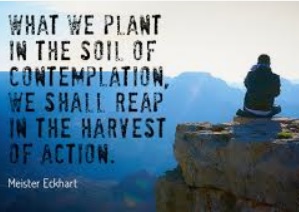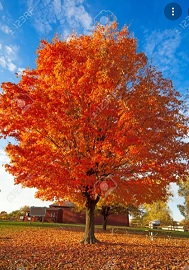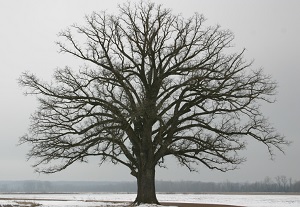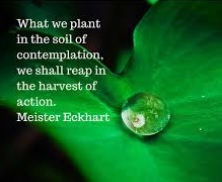The "integration of the negative" rather than insisting that God values perfection or an idealized morality, Francis of Assisi intuited, through the example of Jesus’ life and death, that God could be found in all things, even those our religion and culture urge us to reject. Therapists call this pattern of admitting our shortcomings and failures “embracing our shadow.” Such surrendering of superiority, or even a need for superiority, is central to any authentic enlightenment. The Beatitudes are all about incorporating what seems like disorder (a negative), which promotes a much better and different level of consciousness. (Rohr)
Be whole, just as your heavenly Father is whole/one/inclusive” (Matthew 5:48). (Rohr)
Meditation, Reflection, Contemplation, Prayer

Prayer is generally practised by individuals who believe that god exists outside of themselves, whereas meditation is generally practised by those who know that god exists within themselves.(The Science of Spirituality)
That is why the journey to our true identity is a journey along the way to contemplation. (p55, Merton's Paradise Journey)
The paradox of the contemplative way, therfore always involves a darkening and blinding of the exterior self and an awakening and enlightening of the inner self via God's grace. (p136, Paradise Journey by Merton)
I meditate on your precepts and consider your ways. (Ps 119:15) "For my thoughts are not your thoughts, neither are your ways my ways," declares the LORD. "As the heavens are higher than the earth, so are my ways higher than your ways and my thoughts than your thoughts." (Is 55:8-9)
Spiritual reflection transforms our spitiual life, matures our faith, and improves practice by applying God's Word. (Kofoed 2011)
Contemplative practice is a receptive practice. We make ourselves available for grace to break in; we open ourselves to listen and ponder. When we are receptive we let go of our agendas and expectations. We allow ourselves to see beneath preconceived ideas. Rather than going after what we want in life, or “forcing,” we cultivate a contentment with what actually is. Similarly, instead of “holding back” and merely observing life or falling asleep to it, we stay awake and alert, participating fully in its messiness and we keep our eyes open for the holy presence in its midst.(Rohr)
In contemplative practice, we refuse to identify with any one side, while still maintaining our intelligence. We hold the creative tension of every seeming conflict and go beyond words to pure, open-ended experience, which has the potential to unify many seeming contradictions. We cannot know God the way we know anything else; we only know God subject to subject, by a process of mirroring. This is the “mind of Christ” (see 1 Corinthians 2:16). We have access to a different and larger mind when we recognize that a Divine Flow is already happening and that everyone can plug into it.(Rohr)
see 'Prayers for Grace to have insight or mystical experience'
Meditation vs Contemplation:

While both meditation and contemplation are forms of prayer, the fundamental difference is that meditation is a human mode of prayer whereas contemplation is divinely infused. It means that in meditation one uses images, concepts and reasoning to basically think of created things in relation to God through human effort. Meditation is intended to lead to contemplative prayer. Spiritual masters and mystics tell us that contemplation is not a prayer that we can initiate or make happen. It is divinely produced. The action here belongs to God. The only work we do is to dispose ourselves to receive God’s graces. Meditation helps us to KNOW God and contemplation helps us to LOVE him. (deccanchronicle.com)
We don’t even have to utter a single word. When we don’t know what to say or how to say it, God still hears us. Prayers originating from the meditations of our hearts are acceptable to him (Psalm 19:14). No excess verbiage is needed! (https://www.worldchangers.org)
Be still and know I am God. (Psalm 46:10) Hearing from God requires us to screen out all internal and external distractions that prevent us from focusing on him. We have to hush and listen to what he says, but we also need to quiet ourselves on the inside.
I need to setup a meditation area in the basement with bible, cruxifix, candles, music, sitting area, etc (Randy)
When I first started my quest for a more profound connection with Source, I would meditate for a few minutes each morning. The more I realized just how powerful meditation was, the more I increased my practice. Meditation is the foundation of my spiritual connection. My spiritual practices are essential because the more I connect with Source, the more aligned I feel. When we are in alignment, life flows much more effortlessly. We experience less stress and anxiety. We feel a connection with the Universe and can trust in the guidance we receive. (awakenedadulting.com)
We are spiritual beings having a human experience. As spiritual beings in human form, we are here to move beyond our sense of separation as material beings, while at the same time embracing our materiality. In other words, we awaken to our true nature while still living as beings of flesh and blood. Our physical forms are divine temples, which allow us to interact with this world, in time and space. Being in a body is a gift and should be an unbelievable source of gratitude. (medium.com)
Some things to continue meditating on are: grace, trinity, garden of Eden, ye are gods, paradox/nondual, good and evil, and creation.
Contemplation is an exercise in keeping your heart and mind spaces open long enough for the mind to see other hidden material. It is content with the naked now and waits for futures given by God and grace. As such, a certain amount of love for an object or another subject and for myself must precede any full knowing of it. It is much more like practicing heaven now by leaping into communion with what is right in front of us.(Rohr)
The key to the nondualist way of seeing and living is to embrace "a contemplative way of knowing." Instead of analyzing in black-and-white terms, PAY ATTENTION TO THE GRAY AREAS of "both...and..." possibilties in our lives. The contemplative mind can see things in their depth and in their wholeness.10,p199
Contemplative practice is one powerful way to reclaim attention. Rest your attention with an anchor, a home base for meditation such as the breath, a sensation, an image, a sound, or a mantra. An anchor is a primary meditation object to help steady your attention and limit mind-wandering.(Rohr)
Contemplation:

The essence of contemplative prayer is presence and love. Prayer is a way of living in the Presence, with awareness of the Presence, and even enjoying the Presence. The contemplative secret is learning to live in the now and to realize that everything is right here, right now and God is in this moment. Those who enter deeply into the great mystery do not experience a God who compares, differentiates, and judges. Trusting that love is the deepest stream of reality. That’s why prayer isn’t primarily words; it’s primarily an attitude, a stance. That’s why Paul could say, “Pray always; pray unceasingly” (1 Thessalonians 5:17). If we read that as requiring words, it’s surely impossible. (Rohr)
The soul calls this going forth a "dark night," which is pure contemplation. (p33, Dark Night of the Soul trans by Mirabai Starr)
In Teresa’s Way of Perfection, Chapter 16 in speaking of contemplation she reminds us that God doesn’t give Himself but to those who give themselves entirely to Him.
In contemplation do we feel/experience grace-given peace, joy, meaning, respect, and gratitude? (Randy)
Paradoxically, the path to get to objectless awareness is to start with just one thing, one object.If we can truly love this, whatever this is, it becomes the gateway to everything. How we love one thing is finally how we love everything. We have to find our capacity to see, to love, to accept, to forgive, and to delight in one thing. If we can’t delight in one lizard or one leaf, we are not going to delight in God. How we do anything is how we do everything.
Ultimately, we do not earn or find God. We just get ourselves out of the way. We let go of illusions and the preoccupations of our smaller selves. As the cheap scaffolding falls away, the soul stands revealed. Contemplation is a way to hear with the Spirit and not just with the head. Contemplation is the search for a wide-open space, a space broad enough for the head, the heart, the feelings, the gut, the subconscious, our memories, our intuitions, our whole body. We need a holistic place for discerning wisdom.(Rohr)
This is why contemplative, nondual thinking is absolutely necessary for human flourishing. It is the change that changes everything else. It makes love, forgiveness, and patience possible. Without it, we are forever trapped inside of our judgments.(Rohr)
"You can only spend in good works what you have earned in contemplation.” (Meister Eckhart) We need regular quiet time with God in order to have the strength, courage, and vitality required for social action. (Thurman)
People addicted to their own mind and opinions will find contemplation most difficult, if not impossible. No wonder it is so rare and, in fact, “the narrow road that few walk on” (Matthew 7:14). When our judgmental grid and all its commentaries are placed aside, God finally has a chance to get through to us, because our narcissism and pettiness are at last out of the way. Then Truth stands revealed! (Rohr)
Awareness of God's Presence/Closeness:

Centering Prayer, and teaches a way of praying that involves surrendering our thoughts so that we can simply be in God’s presence: Contemplation is a wordless resting in the presence of God beyond all thoughts and images. So, in contemplation, we’re not thinking of anything. We’re not thinking of anything, but we’re wordlessly resting in a presence beyond thought that’s intimately accessing our heart as we intimately access it, and we rest in the oneness.
Living with a conscious awareness of God’s presence will keep us from sin. An awareness of His closeness will remind us that sin offends and grieves Him.
Living with a conscious awareness of God’s presence will keep us sensitive. An awareness of His closeness will remind us to guard our thoughts, words, and behavior.
Living with a conscious awareness of God’s presence will keep us secure. An awareness of His closeness will remind us that He keeps us and that He cares about us.
Living with a conscious awareness of God’s presence will keep us strong. An awareness of His closeness will remind us that we are His children and that He will continue to empower our lives.
An awareness of His closeness will remind us that He is the Sovereign and that we are the servants.
We are responsible to use good judgment and to serve energetically while we also acknowledge God’s supernatural work in our behalf.
We must attempt to keep in balance man’s efforts and God’s enabling. www.faith.edu/1993/05/a-conscious-awareness-of-gods-presence - A Conscious Awareness of God's Presence
The Grace of Noticing: What aren’t we noticing, what aren’t we seeing — about ourselves, about others, about our world? Someone has called it the “grace of noticing,” essential to the journey along every spiritual path.
“It is a startling and wondrous fact, too often missed, that the present is the edge of creation, that each event emerges into actuality with the freshness and newness of the biblical dawn of creation.” (Eugene Peters)
“Do not pray for easy lives; pray to be stronger women and men. Do not pray for tasks equal to your powers, but for power equal to your tasks. Then, the doing of your work will be no miracle — you will be the miracle. Each day you will wonder at yourself and the richness of life which has come to you by the grace of God.” (Philip Brooks)2/2/20 Syracuse Newspaper - CNY Inspirations by Rev. Peter Shidemantle
Thinking creates the separate self, the ego self, the insecure self. The God-given contemplative mind, on the other hand, recognizes the God Self, the Christ Self, the True Self of abundance and deep inner security. (Rohr,8/31/20)
Because Pelagius saw God as present within all that has life, he understood Jesus’ command to love our neighbor as ourself to mean loving not only our human neighbor but all the life forms that surround us.(Rohr)
Like walking with God in the Garden, we can still be in his presence via meditating and feeling His Love. And in his presence, like in the garden, we can eat again from the Tree of Life. Do the Cherub's guarding the garden, only allow entrance when we are in a nondual/loving state of mind since we are abandoning our choice of duality (from the Tree of Knowledge)? (Randy)
“You were here all the time, and I never knew it! . . . This is nothing less than the house of God, this is the very gate of heaven” (Genesis 28:16–17).
We cannot not live in the presence of God. We are totally surrounded by God. We are eventually able to see the divine image within ourselves, in each other, and in all things. Finally, the seeing is one. How we see anything is how we will see everything. Can we recognize the image of Christ in the least of our fellow human beings? That is Jesus' only description of the final judgment (Matt 25). When we see the image of God where we are not accustomed to seeing the image of God, then we see with the infinitely tender eyes of God. It really is all or nothing. Either we see the divine image in all created things, or we end up not seeing it very well at all. Everything becomes enchanting once we have full sight. All we can do is participate and enjoy.(Rohr)
We can only find God within ourselves. To do so, we must learn to live in the present (presence) moment. The present moment is the only time and place in which we can truly experience the 'presence' of God.(ePost 9/23/22) - see Know the Treasure Within
Jesus reassures his disciples that he is present with them through love, trust, and faith in him, not in ideas about him. (Freeing Jesus)
Inner Presence would be described as the Holy Spirit, which is precisely God as immanent, within, and even our deepest, truest self. God is the very ground of our Being. Yet it still must be awakened and chosen. The Holy Spirit is totally given and given equally to all, but must be consciously received, too. The Presence needs to be recognized, honored, and drawn upon to become a living Presence within us. (Rohr)
See Presence thru Grace and Practice
Some Past Reflections:

Thinking/meditating on the 'tree of life' and 'tree of knowledge of good and evil':
| Tree of Life | Tree of Knowledge |
|---|
| Life | Death |
| Faith and trust on Godness | Knowledge and focus Material |
| Connection w God | Separation from God |
| Dependence on God | Independence from God |
| Choosing Nonduality | Choosing Duality |
| Obedience | Disobedience |
Thinking/meditating about 'good and evil':
- If God is All, then God immanently contains evil, but transdentally God is total goodness
- Perhaps immanently God is imperfect is because He allows freedom and therefore leaves it open to mankind to participate in it's fulfillment.
- Similiarly the word God is one "O" short of spelling good(ness) since we are the participating "O" to make it so.
Thinking/meditating 'if ye are gods' (small 'g'):
- since we were created in the image and likeness
Thinking/meditating on 'grace':
- whereas we are totally dependent upong God
- and whereas God's love is not meritted in any way
- be it resolved that my blessings are in no way, shape, or form because of any reward, but purely given freely by God because of His unconditional Love.
Thinking/meditating/trying to be more deeply aware of 'paradox' and 'nondual':
- Paradox - God being presence in silence
- Nonduality - Creation being both visible and invisible
- Yin Yang
Thinking/meditating on 'Trinity':
- Wisdom Pattern - Order, Disorder, Reorder (Richard Rohr)
- Law of Three - affirming/active, denying/passive, and reconciling/neutralizing (Cynthia Bourgeault)
- The 3rd force/spirit always includes the 2nd and transcends
- The 3rd force brings the other 2 forces into relationship, from which forward momentum can emerge
- The capacity to recognize and consciously mediate 3rd force belongs to unitive or nondual consciousness
Living in the Now Moment with Gratitude:




Our nature is already endowed with grace, and thus our task is to be attentive to that which is within and that which is without—mind and heart—so that we may contribute to building up the world in love.(Rohr)
When you express gratitude in the present moment, you are silencing (albeit temporarily) the desire for more and comparison to others. (nosidebar.com/gratitude-practice)
Find the “narrow gate that leads to life.” It is called the Now. Narrow your life down to this moment. (Rohr)
Breathing in, I calm my body.
Breathing out, I smile.
Dwelling in the present moment,
I know this is a wonderful moment! (Thich Nhat Hahn)
Meditate on 'The Balance of Reality' and Harmony:

See lyrics from the Moody Blues song "A Question of Balance"
Play a video of the song: "The Balance"
St. Ignatius spoke of people having “disordered affections”—being ruled by desires rather than free to make wise choices. When we don’t practice temperance, eventually our affections will become disordered. A temperate person honors her desires and passions as gifts from God, but she does not constantly rearrange her life according to the ongoing flux of those desires and passions.
Every living thing has its own creation song, its own language, and its own story. In order to live harmoniously with the rest of creation, we must be willing to listen to and respect all of the harmonies that are moving around us. We must tune in to our ability to see beyond the physical reality that surrounds us, and awaken to the vast unseen world that exists. We see the underlying structures that support our world, and life begins to take on new shape, new meaning. When we live as multisensory beings, we find that we are able to comprehend the language of every living thing. And we come to realize that it is the interwoven substance of these floating rhythms that holds us in delicate balance with all life.(Rohr)
Meditate not on 'Perfection', but on ...:

Franciscan alternative orthodoxy emphasized mysticism over morality. Moralism is the task of low-level religion, concerned with creating an ego identity that seemingly places us on moral high ground.
Scripture, Jesus, the mystics, and the saints recognized that the goal of religion is not a perfect moral stance, but union with God. Mysticism is about connection not perfection. Perfectionism always leads to individualism—as if the individual could ever be perfect.
For those who see deeply, there is only One Reality; there is no distinction between sacred and profane. Rohr 2/7/20
The harmonic of the universe is wholeness, not perfection; more specifically, it is wholeness that involves differentiation. Wholeness and love are inseparable. In the words of Ilia Delio, “Our challenge today is to trust the power of love at the heart of life, to let ourselves be seized by love, to create and invent ways for love to evolve into a global wholeness of unity, compassion, justice, and peacemaking.” This is living wholeness and love. (Rohr,5/25/21)
Spare me perfection. Give me instead the wholeness that comes from embracing the full reality of who I am, just as I am.—David Benner, Human Being and Becoming
A more appropriate view of creation would be not perfection but potential. God allowed for creation to live freely into its potential. Sometimes creation will live up to and into its potential, while other times it will renounce it. Potential reminds us once again that goodness is both an origin and a goal. It is given to us as a gift, but it is also given to us as a calling. (Rohr)
Trust to believe God’s pronouncement that everything God created is very good—even in its imperfect state. We seem to believe that only perfect things are lovable. Perfection is invariably our own self-created notion, manufactured largely in our own thinking mind or by our culture; thus, it is both delusional and, finally, self-defeating—as well as a major enemy and obstacle to loving what is right in front of us. We who have spent our lives ascending the spiritual ladder have a harder time hearing this truth. For the truth isn’t found up at the top of our striving, but down at the bottom in our deepest nature. By trying to climb the ladder upward we miss Christ, who comes down through the Incarnation.(Rohr)
Various Meditations:
Why is there evil and suffering?

tbd
What is Truth:

The truth shall set you free.
We think that we built walls to keep us in peace, but it's completely backward. The more we hide, the more fearful we become. Fear builds walls, but truth builds bridges. (Tao Peace, p53-6)
Discernment vs Judgment:

tbd
The hardest way is usually the best way

Autumn and Winter:


Clearly the autumn tree denotes the acquiring of wisdom and beauty in our aging and maturity. The winter tree denotes old age and death. Winter, however, is good for the world around us. Many plants need shorter days and low temperatures to become dormant. This way plants can store up energy for new growth. If a fruit tree doesn't have enough chilling time, it will produce fewer, weaker buds. (Google)
Contemplation and Mysticism:

Contemplation and mysticism... both mean loving experiential awareness of God: not ideas in the head or on the lips, but personal living experience. (Rohr, 4/21/20)
Contemplation shouldn’t be used to spiritually bypass what is real, harmful, or unjust in our lives or the world around us. However, with steady practice it will eventually give us the ability to stay present to what is, and meet it with wisdom, compassion, and courage. (Rohr,10/23/20)
To be a contemplative is to be able to see each epiphany of nature, to enjoy it, protect it, and draw upon it for the common good.(Rohr)
Mystics look out from different eyes that see the grace in all things and the deep connection between all things. (Rohr)
Contemplation and Action:

The reason why the true contemplative-in-action is still somewhat rare is that most of us are experts in dualistic thinking. And then we try to use this limited thinking tool for prayer, problems, and relationships. We cannot grow without a strong tolerance for ambiguity, an ability to allow, forgive, and contain a certain degree of anxiety, and a willingness to not know. This is how we allow and encounter Mystery. (Rohr,7/12/20)
Become God’s hands and feet and microphone for healing and justice.via a path of contemplative action:
- First commit to engaging with the world from a place of prayer, and not ideology; this gives you a felt sense of interconnectedness of all life in God and prevents othering.
- Second, commit to doing the work of coming to terms with your social location and how it relates to systemic racism, poverty, militarism, ecological devastation, and some of the distorted moral narratives that are so prevalent. Are there privileges you need to acknowledge or let go of?
- Third, remember that talking about justice is not the same as doing justice, so simplify your life and commit to ethical living by buying all your necessities in socially responsible, ecologically minded, and human-scale companies.
- Practice works of mercy, making sure that your hands are touching the hands of someone who is suffering, [and] include Mother Earth in that as well.
- Join a social movement, because changing your spending habits or serving others is only part of what is needed. Our lives and relationships do not happen in a vacuum but rather within institutions and systems that have their own crooked logic and are in need of massive changes.